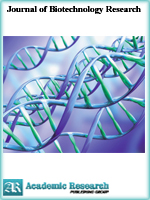Journal of Biotechnology Research
Online ISSN: 2413-3256
Print ISSN: 2413-8878
Print ISSN: 2413-8878
Quarterly Published (4 Issues Per Year)

Archives
Volume 1 Number 6 December 2015
Hepatotoxic Effect of Aqueous Leaf Extract of Millettia Aboensis on Wistar Rats
Authors: Onyegeme-Okerenta Blessing M. ; Onyeike Eugene N.
Pages: 26-30
Abstract
The effect of aqueous leaf extract of Millettia aboensis on the liver of Wistar rats was investigated. The experimental animals were divided into six groups based on their body weight. Groups 1 - 5 were administered with 1000, 2000, 3000, 4000 and 5000mg/kg body weight of the extract respectively while the control group was given normal feed and water. The administration of the extract was for 7days and thereafter, the rats were sacrificed and the effects of the plant extract on the liver investigated. Liver function tests and histological examinations of the liver were carried out. Results for liver enzyme assay showed that aspartate aminotransferase (AST) activity significantly increased (p<0.05) in the different groups as compared to the control group (200.1 ± 3.12IU/L). It was observed that enzyme activity increased with increase in the concentration of the extract. Activities of alanine aminotransferase (ALT) for Groups 1 - 5 ranged from 53.13 ± 2.12IU/L to 80.67 ± 0.68IU/L. For alkaline phosphatase (ALP), activities of the enzyme for Groups 1 - 5 ranged from 150.5 ± 3.00IU/L to 483.2 ± 1.68IU/L. Photomicrograph of rats in Groups 1 and 2 showed normal liver architecture with preserved central vein and normal cytoplasm when compared to the control group. However, photomicrographs of the liver of rats in Group 3 showed moderate distortion and mild degeneration of the hepatocyte. Group 4 showed severe vacuolar degeneration while group 5 showed ballooning and vacuolar changes in the hepatocytes. The results of this study suggest that aqueous leaf extract of M. aboensis was hepatotoxic to Wistar rats, and toxicity was dose-dependent.



